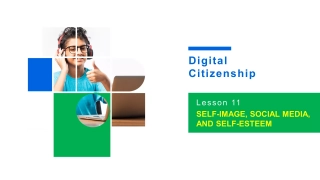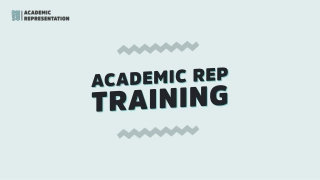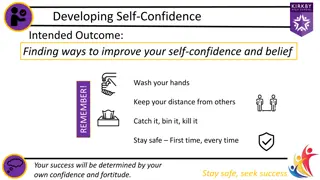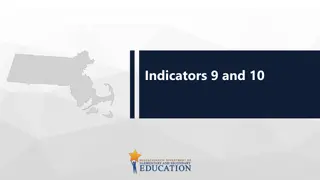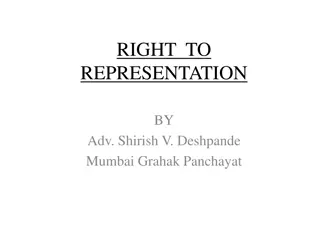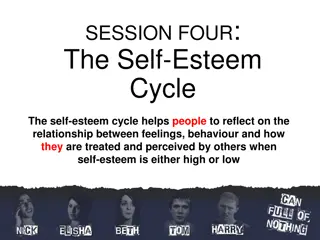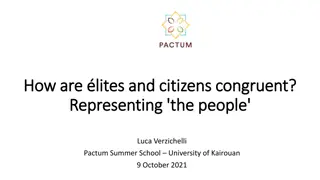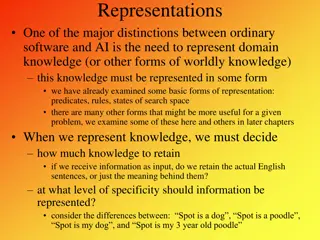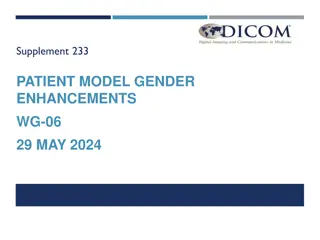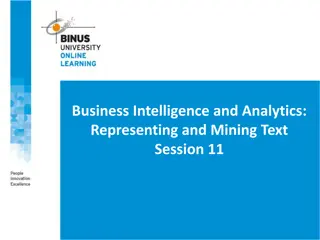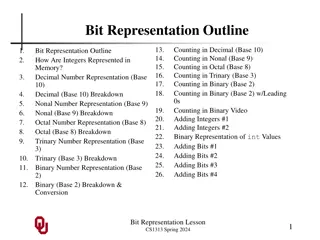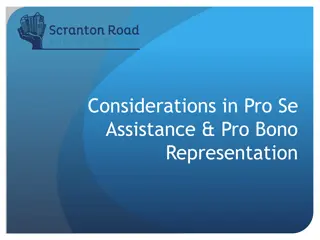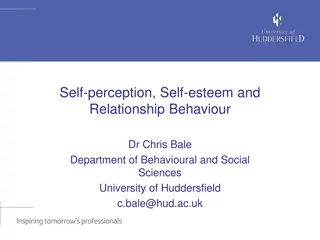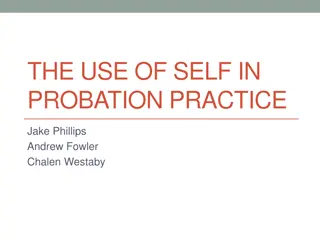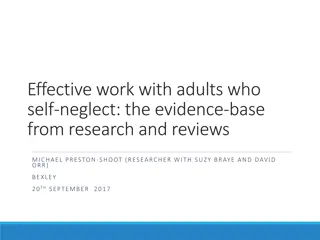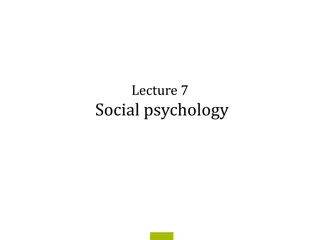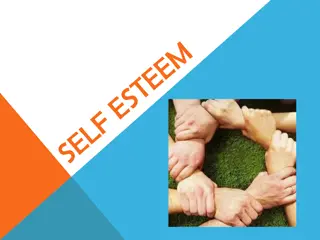Digital Citizenship: Self-Image, Social Media, and Self-Esteem
Explore the impact of social media on self-image and self-esteem. Learn about the influence of filters and media on body perception. Reflect on self-assessment and take-home activities to improve self-confidence.
3 views • 11 slides
Academic Representation at Royal Holloway University
Academic representation at Royal Holloway University plays a crucial role in enhancing the educational experience for students. The system involves various levels of representation with specific responsibilities to ensure effective communication among students, Course Reps, and academic staff. Recen
3 views • 28 slides
Exploring LGBTQ+ Representation in School Geography Curriculum
This research project, led by Alice Hoy, focuses on addressing LGBTQ+ narrative inclusivity in secondary geography classrooms and curriculum. It emphasizes the importance of research at global, national, and local scales, highlighting the impact of bullying, mental health, and wellbeing on LGBTQ+ st
0 views • 10 slides
Understanding Self-Worth in Children: Building a Strong Foundation
Explore the importance of self-concept, self-esteem, and self-worth in children's development. Learn how parents can positively impact a child's self-perception and self-value through nurturing experiences. Discover the key sources influencing children's self-worth and the critical role of early lif
0 views • 30 slides
Understanding Self-Esteem: Meaning, Importance, and Types
Self-esteem is how we perceive our worth and value. High self-esteem leads to confidence and positivity, while low self-esteem can result in self-doubt and negative emotions. Self-esteem impacts mental health, behavior, decisions, relationships, and overall success in life. Recognizing and nurturing
2 views • 15 slides
Understanding Self-Esteem and Ways to Improve It
Self-esteem is our perception of ourselves, impacting how we navigate life. Healthy self-esteem fosters positivity, while low self-esteem can be detrimental. Various factors, like childhood experiences, contribute to low self-esteem, but steps can be taken to improve it. Building positive relationsh
0 views • 14 slides
Understanding the Self: Psychology's Focus and Implications
The field of psychology has long been intrigued by the concept of self, exploring its importance to well-being, self-esteem, and brain localization. Research reveals how excessive optimism, self-bias, and blindness to incompetence can impact self-esteem. Contrasting individualist and collectivist cu
1 views • 41 slides
Building Self-Confidence: Key Steps and Benefits
Understanding self-confidence, its importance, and how to develop it can lead to enhanced resilience, motivation, reduced fear and anxiety, and a stronger sense of self. Self-confidence allows for confident behavior, while lack of it can lead to self-doubt and avoidance of risks. Learning to embrace
0 views • 7 slides
The Importance of Self-Awareness in Personal Growth
Self-awareness is crucial for understanding one's character, feelings, and motivations. It helps in recognizing strengths and weaknesses, managing stress, improving communication, and fostering empathy. Developing self-awareness involves introspection, mindfulness, self-reflection, and seeking feedb
2 views • 47 slides
Analysis of Indicators 9 & 10 in Special Education Representation
The indicators 9 and 10 focus on the disproportionate representation of racial and ethnic groups in special education programs. Specifically, Indicator 9 looks at the overall disproportionate representation of groups eligible for special education, while Indicator 10 examines the disproportions with
1 views • 8 slides
Developing a Self-Care Action Plan for Overall Well-Being
Self-care involves deliberate activities to nurture mental, emotional, physical, and spiritual health, yet it is often neglected. This guide explores the essence of self-care, emphasizes the importance of building a personalized self-care action plan, and provides insights into taking care of your b
0 views • 19 slides
Franco-Gonzalez Litigation and Advocacy Timeline
The Franco-Gonzalez litigation timeline outlines efforts to provide legal representation and protections for individuals with serious mental disorders in detention or removal proceedings within the U.S. The case involves creating competency determination systems, advocating under the Rehabilitation
1 views • 14 slides
Understanding the Right to Representation in Consumer Protection
The Right to Representation in consumer rights allows consumers to be heard and ensures their interests are considered in various forums. In India, the Consumer Protection Act of 1986 recognized this right and established Consumer Protection Councils at different levels. These councils play a crucia
0 views • 13 slides
Enhancing Self-Confidence for Professional Success
Understanding the importance of self-confidence in the workplace is crucial for personal growth and career advancement. Self-confident individuals trust their abilities, maintain a sense of control over their lives, and have realistic expectations. This summary delves into the characteristics of sel
0 views • 13 slides
Understanding the Self-Esteem Cycle: High vs Low Self-Esteem
The self-esteem cycle explores the interplay between one's feelings, behavior, and how they are treated based on their self-esteem level. High self-esteem is associated with positive feelings, supportive behavior, and positive interactions, while low self-esteem manifests in negative emotions, withd
9 views • 4 slides
Understanding Federalist and Anti-Federalist Views on Government Representation
The documents provided showcase the differing viewpoints of Federalist Alexander Hamilton and Anti-Federalist Melancton Smith on government representation in the context of the new Constitution. Hamilton argues for a system that does not prioritize wealth or education, while Smith emphasizes the nee
0 views • 8 slides
Understanding the Congruence between Elites and Citizens in Representation
The relationship between elites and citizens in representative democracy is explored, tracing historical antecedents, the marriage between representation and democracy, modern representation models, and the roles of representatives. Key themes include responsiveness, responsibility, formalistic, des
0 views • 9 slides
Understanding Knowledge Representation in Artificial Intelligence
In AI, representing domain knowledge is crucial and comes in various forms like predicates, rules, and search space states. Deciding the level of specificity and form of representation is key. Knowledge can be categorized into procedural, domain, and common sense knowledge, available in forms such a
2 views • 32 slides
Enhancing Access to Justice through Limited Assistance Representation in Massachusetts
The Massachusetts Judiciary, led by First Justice Hon. Dina E. Fein, has implemented Limited Assistance Representation (LAR) to allow attorneys to assist self-represented litigants on a limited basis. This initiative aims to expand access to justice by providing legal support without full representa
0 views • 8 slides
Enhancing Self-Regulation for Formative Assessment through Social and Emotional Learning
Explore the significance of self-regulation in formative assessment, understand key concepts like self-control, emotional competence, and perseverance. Discover actionable strategies to implement self-regulation interventions with students and train other adults effectively. Future orientation and s
0 views • 25 slides
Understanding Mindful Self-Judgment and Its Role in Mental Health
Mindful self-judgment is a complex concept that involves balancing self-awareness and self-compassion. While nonjudgment is a key aspect of mindfulness practices, there is a debate on whether mindful self-judgment can be appropriate and functional in certain circumstances. Researchers like June Pric
2 views • 46 slides
Understanding Self-Esteem: Highs and Lows
Self-esteem is the judgment we hold about ourselves, shaped by experiences and relationships. High self-esteem individuals embrace new encounters with confidence and positivity, while low self-esteem individuals struggle with self-doubt and criticism. Recognizing signs of low self-esteem is crucial
0 views • 11 slides
Enhancing Self-Regulation Skills in Children: Strategies and Tips
Understanding and fostering self-regulation in children is crucial for their development. Self-regulation involves controlling impulses, focusing, and shifting between tasks. This article delves into the internal mechanisms of self-regulation, such as executive function, and provides practical tips
1 views • 22 slides
Enhancements in Gender Identity Representation in Healthcare
This content discusses the updates and additions to DICOM attributes and CID code lists related to patient gender identity representation. It addresses the use of sex and gender identity data in healthcare settings, focusing on cases like transgender patients undergoing hormone transition. The HL7 G
0 views • 12 slides
Understanding Text Representation and Mining in Business Intelligence and Analytics
Text representation and mining play a crucial role in Business Intelligence and Analytics. Dealing with text data, understanding why text is difficult, and the importance of text preprocessing are key aspects covered in this session. Learn about the goals of text representation, the concept of Bag o
0 views • 27 slides
Understanding Integer Representation in Computer Memory
Explore the binary representation of integers in computer memory, covering decimal, nonal, octal, trinary, and binary numbering systems. Learn how integers are stored using sequences of bits and decipher the breakdown of numbers in different bases. Discover the Arabic digits in decimal representatio
0 views • 26 slides
Boosting Your Child's Self-Esteem & Confidence in Parenting Workshop Series
Understanding self-esteem in children is crucial for their emotional development. Healthy self-esteem leads to positive behaviors, while low self-esteem can result in negative self-perceptions. Recognizing signs of healthy and unhealthy self-esteem allows parents to support and nurture their child's
0 views • 11 slides
Enhancing Self-Efficacy and Self-Determination in the Workplace
Establishing high levels of self-efficacy and self-determination in the workplace is crucial for accomplishing tasks and goals effectively. This publication explores the significance of these traits, providing strategies for managers to foster and maintain them. Discover why self-efficacy and self-d
0 views • 8 slides
Understanding Pro Se Assistance and Pro Bono Representation
This material delves into the considerations, course outlines, justifications, and constitutional basis for assisting pro se litigants and encouraging pro bono representation. It covers the need for self-representation, limitations to the right, the increase in pro se litigants, and the constitution
0 views • 51 slides
Understanding Self-Perception, Self-Esteem, and Relationship Behavior
The discussion explores the impact of low self-esteem on various psychological issues, societal views on self-worth, self-perception biases, and the consequences of self-esteem in different aspects of life, backed by research and theories such as the Better-Than-Average Effect and Sociometer Theory.
0 views • 19 slides
Understanding Self-Acceptance and Overcoming Stigma
Self-esteem and self-acceptance are distinct concepts, with self-acceptance focusing on embracing all facets of oneself unconditionally. Developing self-acceptance involves stages like aversion, curiosity, tolerance, and allowing. Overcoming avoidance and resistance can lead to self-compassion and g
0 views • 10 slides
The Use of Self in Probation Practice: Understanding Self-Disclosure and Its Implications
Explore the concept of self-disclosure in probation practice, examining different methods, findings, and implications. Discover the two schools of thought regarding self-disclosure and delve into the various realms and subtypes of self-disclosure practices. Gain insights into the forms of self-discl
0 views • 25 slides
Understanding Leadership and Self-Leadership for Personal Development
Leadership is defined as an influence relationship between leaders and followers striving for real change. It involves self-awareness, self-management, and self-development. Self-leadership begins with understanding oneself, motives, and capabilities through self-awareness, ultimately leading to pur
0 views • 42 slides
Electoral Systems and Minority Representation
Various electoral systems, including district and at-large voting, impact how minorities are represented in government. District systems can provide more proportional representation for minorities if they are geographically concentrated, while at-large systems often result in minority under-represen
0 views • 14 slides
Understanding Self-Neglect in Adults: Challenges and Research Insights
This content delves into the complex issue of self-neglect in adults, covering its definition, key challenges, and the research evidence available. It explores the various aspects of self-neglect, including neglect of self-care, domestic environment, and refusal of services. The challenges associate
0 views • 39 slides
Understanding the Self in Social Psychology
Delve into the concept of the individual and the self in social psychology, exploring how identities have evolved historically and the distinction between collective and individual selves. Learn about self-awareness, Wundt's differentiation of I and me, and Higgins' self-discrepancy theory, shedding
0 views • 84 slides
Understanding Electoral Formulas and Proportional Representation
Electoral formulas play a crucial role in translating individual votes into legislative seats, with systems like Proportional Representation and Winner-Takes-All affecting government structure and representation. Proportional systems aim for fair seat allocation based on vote share, while non-propor
0 views • 13 slides
Universal Design for Learning (UDL) and Multiple Means of Representation
Explore the concepts of Universal Design for Learning (UDL) and Multiple Means of Representation in education. Learn about the importance of representation in learning, how to apply multiple means of representation, and practical strategies to enhance learning inclusivity. Engage in discussions and
0 views • 34 slides
Correlation Between Self-Efficacy and Test Performance Based on International Assessment Data
Explore the correlation between self-efficacy, readiness to learn, intrinsic and extrinsic motivation with test performance using data from international assessments like PISA and PIAAC. Learn about the limitations of linear models in psychological research and the debate around self-efficacy accord
0 views • 32 slides
Boosting Self-Esteem: Benefits and Tips for Improvement
Understanding self-esteem, its benefits, and risks of low self-esteem are essential for personal growth. Developing high self-esteem can lead to increased self-respect, goal achievement, and willingness to try new things. On the other hand, low self-esteem can make individuals vulnerable to peer pre
0 views • 10 slides
